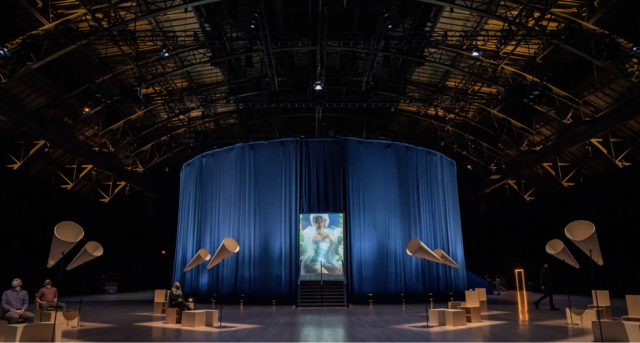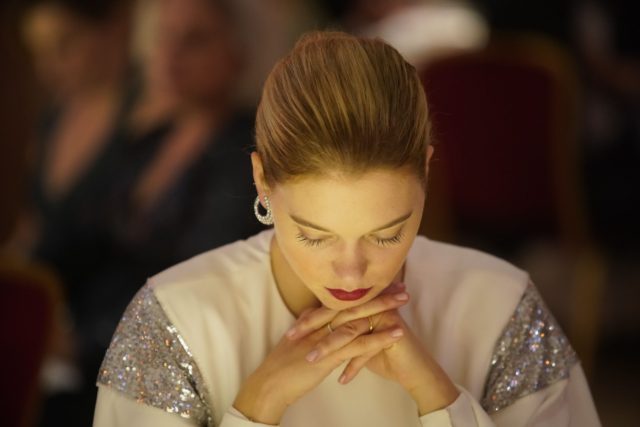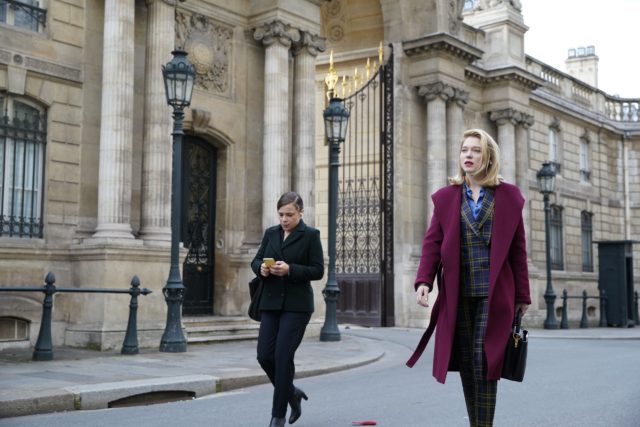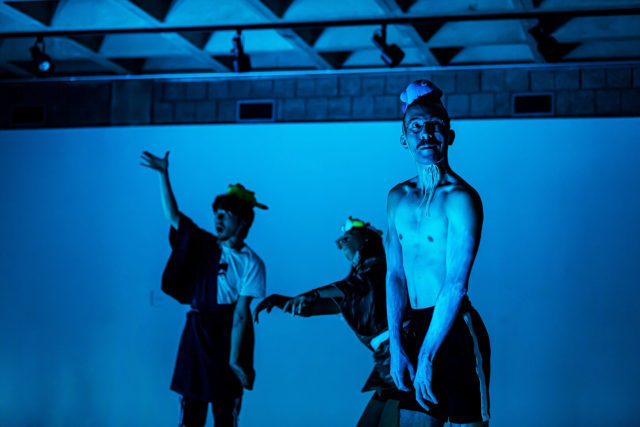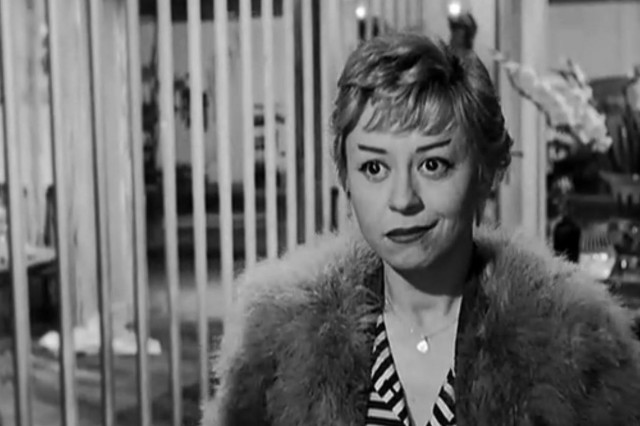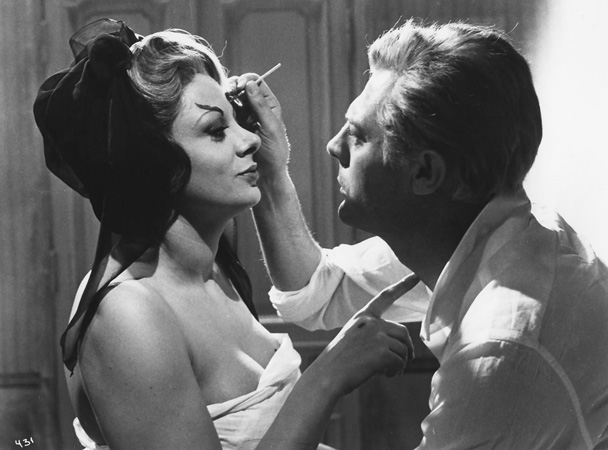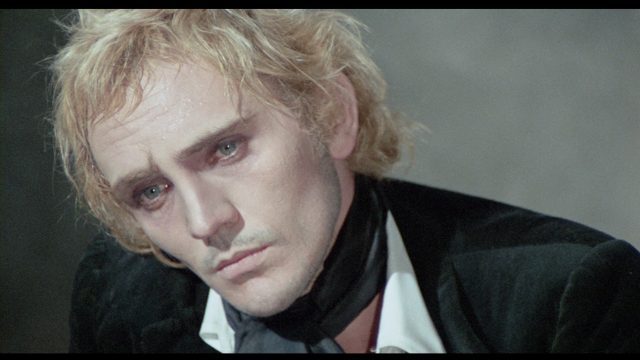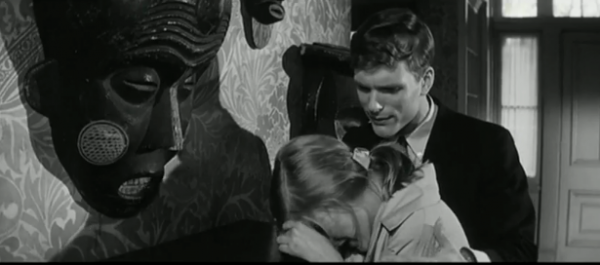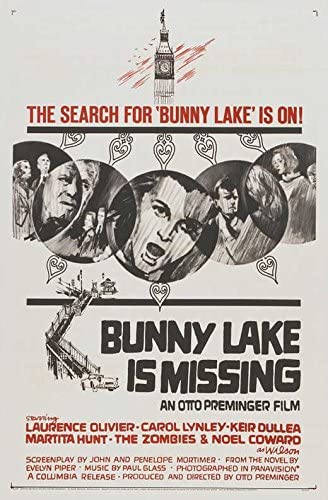
Kang (Lee Kang-sheng) is tired of being isolated in Tsai Ming-liang’s Days
CURATORS’ CHOICE 2021
Museum of the Moving Image
35th Ave. at 36th St., Astoria
Through January 16, $15
718-777-6800
movingimage.us
After canceling its 2020 iteration because of the pandemic lockdown, the Museum of the Moving Image’s annual Curators’ Choice series is back with eighteen of the best films of 2021, plus one streaming series, screening in the Redstone Theater through January 16. The works run the gamut from musicals, animation, Westerns, and thrillers to existential dramas, romances, and tragedies, from well-known hits to less-familiar international fare. While some of the films are available online, most can be seen only in theaters, so this is a great chance to catch such films as The Power of the Dog, The Mitchells vs. the Machines, and Summer of Soul with an audience on the big screen, the way they were meant to be seen. And if you don’t have Amazon Prime, get ready to be blown away by Barry Jenkins’s ten-part The Underground Railroad, a harrowing adaptation of the award-winning book by Colson Whitehead. Keep watching this space for more reviews of many of the below films.
Monday, December 27
WHAT DO WE SEE WHEN WE LOOK AT THE SKY (Alexandre Koberidze, 2021), 4:00
Tuesday, December 28
THE MITCHELLS VS. THE MACHINES (Mike Rianda & Jeff Rowe, 2021), 1:00
PREPARATIONS TO BE TOGETHER FOR AN UNKNOWN PERIOD OF TIME (FELKÉSZÜLÉS MEGHATÁROZATLAN IDEIG TARTÓ EGYÜTTLÉTRE) (Lili Horvát, 2020)
Tuesday, December 28, 4:00
greenwichentertainment.com
Hungary’s official submission for the 2020 Academy Awards, Lili Horvát’s sophomore film, Preparations to Be Together for an Unknown Period of Time, is a kind of neo-noir psychological thriller in which a neurosurgeon sacrifices just about everything in order to pursue a romance that might not even be real. Dr. Márta Vizy (Natasa Stork) has arranged a rendezvous with Dr. János Drexler (Viktor Bodó), who she met at a medical conference in New Jersey a month before, but when he doesn’t show up, she tracks him down and he acts like he doesn’t know her.
Sure that he is her true love, Márta, a single woman about to turn forty who has made a successful life for herself in New Jersey, decides to leave her job and move back to Budapest, accepting a position that is well beneath her, at a hospital where she has to supply herself with her own toilet paper, in order to be close to János and convince him that they should be together. As János continues to claim they’ve never met, Márta starts doubting her sanity. When her therapist asks her, “What do you think about this?” she answers, “That I’ve lost my mind. That I wanted this so badly that I made the whole thing up. And that I’ve filled in every detail so even I believed it happened.” Meanwhile, Alex (Benett Vilmányi), a medical student whose father Márta is treating, is pursuing her, sure that she is the one for him.
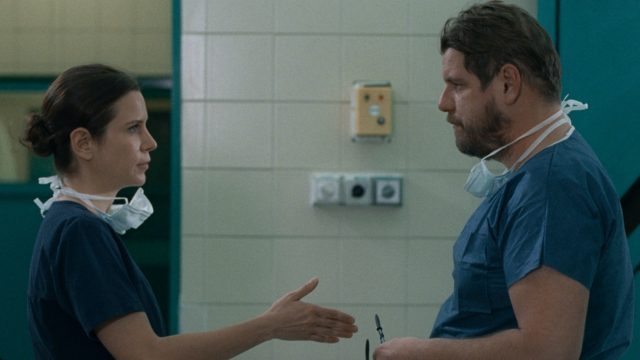
Dr. Márta Vizy (Natasa Stork) is obsessed with Dr. János Drexler (Viktor Bodó) in Hungarian neo-noir thriller
Preparations is a gripping tale of obsession and love as Horvát (The Wednesday Child) delves into what humans tell themselves when they want to believe something, how far they will go to persuade themselves what they need. Márta is a brilliant neurosurgeon with a magic touch, able to go into patients’ brains to restore sight, hearing, speech, and balance, but she is unable to diagnose her own situation. (Or is she?)
Stork is exceptional as Márta; Horvát regularly zooms in on her face and eyes as she searches within herself for the truth. Márta is unsteady the way many of us can be unsteady; she doubts herself the way we can doubt ourselves even when refusing to believe that we might be wrong. Preparations is a tense, slow-paced mystery that also features one of the most charming scenes of the year, involving a surprising and unique walk on the way to an unexpected ending.
Wednesday, December 29
BERGMAN ISLAND (Mia Hansen-Løve, 2021), 4:00

An average family take off on an unexpectedly adventurous road trip in The Mitchells vs the Machines
THE MITCHELLS VS THE MACHINES (Mike Rianda & Jeff Rowe, 2021)
Wednesday, December 29, and Thursday, December 30, 1:00
www.netflix.com
“It’s almost like stealing people’s data and giving it to a hyperintelligent AI as part of an unregulated tech monopoly was a bad thing,” computer genius Mark Bowman (voiced by Eric André) says incredulously in Mike Rianda and Jeff Rowe’s animated film, The Mitchells vs the Machines, about how one average family tries to save the world from a robot apocalypse. Originally titled Connected prior to the pandemic, the movie is set in modern times, as burgeoning filmmaker Katie Mitchell (Abbi Jacobson) gets ready for her freshman year at college. To make up for a fight they had, her father, technology luddite Rick (Danny McBride), decides to drive Katie cross-country to school as a bonding trip, joined by her mother, Linda (Maya Rudolph), her younger brother, the dinosaur-obsessed Aaron (Rianda), and their hapless dog, Monchi (Doug the Pug).
While they’re out on the road, Dr. Bowman, the ruthless dude behind PAL Labs, has released its latest product, robots that will replace its virtual AI assistant, PAL (Olivia Colman), a takeoff on Alexa/Siri. But PAL is not happy about being tossed in the trash, so she has reprogrammed the robots to capture every human being and launch them into space forever. With the help of two damaged robots, Deborahbot 5000 (Fred Armisen) and his buddy, Eric (Beck Bennett), the Mitchells must find a way to trigger the robots’ kill code before it’s too late.
Exciting and fun, The Mitchells vs the Machines is kind of an alternate take on the 2004 Pixar hit The Incredibles, although the Mitchells are not exactly superheroes; they’re just your basic family, with plenty of their own problems. In fact, they’re jealous of their neighbors, the Poseys (Chrissy Teigen, John Legend, and Charlyne Yi), who appear to be everything they’re not. Traveling in their filthy burnt orange 1993 Sensible station wagon, the Mitchells spend more time arguing than coming together, until they have no choice if they want to survive as they face not only PAL and the evil robots but also their own fears and worries — as well as an army of Furbies. “Most action heroes have a lot of strengths,” Katie narrates. “My family only has weaknesses.” But even weaknesses can be turned into strengths in the right situations.
Thursday, December 30
BENEDETTA (Paul Verhoeven, 2021), 4:00
Friday, December 31
THE UNDERGROUND RAILROAD: THE COMPLETE SERIES (Chapters 1–5) (Barry Jenkins, 2021), 12:30
Saturday, January 1
THE UNDERGROUND RAILROAD: THE COMPLETE SERIES (Chapters 6–10) (Barry Jenkins, 2021), 12:30
THE SOUVENIR PART II (Joanna Hogg, 2021), 6:30
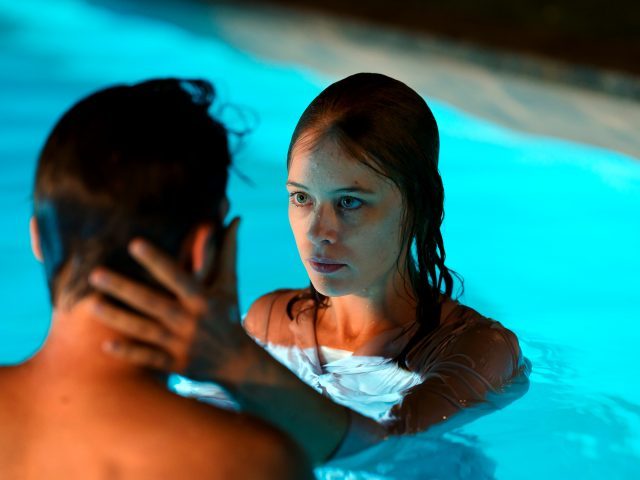
Paula Beer stars as the mysterious title character in Christian Petzold’s award-winning Undine (photo by Christian Schulz)
UNDINE (Christian Petzold, 2019)
Sunday, January 2, 1:00
www.ifcfilms.com/films/undine
Master German writer-director Christian Petzold (Phoenix, Barbara) gives a unique contemporary twist to a classic European fairy tale in Undine. The less you know about the original myth the better, but let’s just say it involves a water nymph, romance, betrayal, and death.
Paula Beer was named Best Actress at the Berlin International Film Festival and at the European Film Awards for her powerful performance as Undine Wibeau, a historian who gives architectural tours of expansive, heavily detailed models of the past, present, and future of Berlin for the Senate Administration for Urban Development. Early on, when her boyfriend, Johannes (Jacob Matschenz), tells her that he is in love with another woman, Nora (Julia Franz Richter), Undine sternly says, “If you leave me, I’ll have to kill you.” There is no reason to doubt her.
Distressed by the situation, she is standing uneasily in a café, looking at an aquarium filled with colorful fish and a small statue of a diver when Christoph (Franz Rogowski), who just attended one of her talks, hesitantly approaches her and offers praise for the lecture. An accident shatters the glass of the aquarium and Undine and Christoph are knocked to the ground, drenched in water. As the fish squirm for life on the floor, Undine and Christoph instantly fall in love. “I’m usually under water,” Christoph, an industrial diver, says to her. German romanticism and French Impressionism mix with magical realism and a revenge thriller as Christoph and Undine run around together, reveling in their love until another accident results in serious trouble.
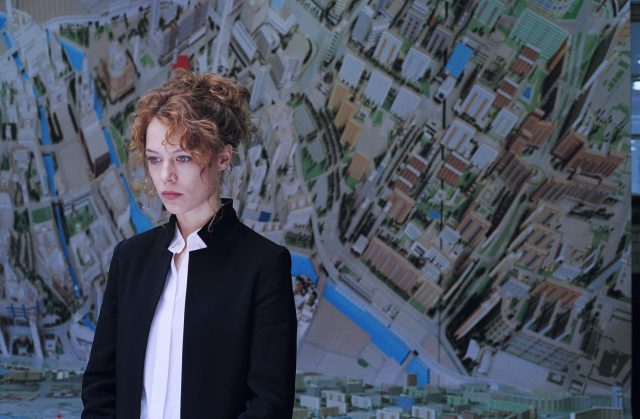
Undine (Paula Beer) is an architectural historian who is drawn to water in myth-based drama
Among the distinguished writers and composers who have told their own versions of the story of Undine are Friedrich de la Motte Fouqué, Oscar Wilde, E. T. A. Hoffman, Edgar Allan Poe, Sergei Prokofiev, Hans Christian Andersen, Seamus Heaney, Claude Debussy, and DC Comics. Audrey Hepburn won a Tony for her performance as the title character in Jean Giraudoux’s Ondine on Broadway in 1954. In 2010, Neil Jordan’s Ondine, coincidentally also released on June 4, starred Colin Farrell as a fisherman who catches a woman known as Ondine (Alicja Bachleda) who has a special connection with water.
Water is central to Petzold’s film, from the aquarium to Christoph’s job to Johannes’s pool. Berlin itself was built on a swamp, adding relevance to Undine’s architectural lectures, in which she explains that the name of the city means “dry place in the marsh.” When she is searching for Johannes, she goes into the men’s bathroom and one of the faucets is dripping, the noise echoing down an empty hallway. When Johannes wants to go away with Undine, he tries to lure her by mentioning he’s booked the room they like “overlooking the pond.” Much of the film takes place underwater, with the actors in and out of their scuba gear, beautifully filmed by cameraman Sascha Mieke. (Unfortunately, the giant catfish is animated.) Hans Fromm is the aboveground cinematographer, lushly capturing the streets of Berlin as well as the forest surrounding the lake where Christoph works with Monika (Maryam Zaree) and Jochen (Rafael Stachowiak).
Beer and Rogowski have an intense chemistry that drives the film; they starred together in Petzold’s previous film, Transit, which deals with political refugees, stolen identity, and forbidden love, and are both magnetic here again, whether aboveground or below. The soundtrack’s theme features pianist Vikingur Ólafsson’s gorgeous, haunting rendition of Bach’s Concerto in D Minor, BWV 974 – 2. Adagio. “Everything is there in Johann Sebastian’s music: architectural perfection and profound emotion,” Ólafsson has said, which relates directly to Petzold’s film itself.
Sunday, January 2
BENEDETTA (Paul Verhoeven, 2021), 3:00
DAYS (Tsai Ming-liang, 2020), 6:00
Friday, January 7
THE FRENCH DISPATCH (Wes Anderson, 2021), 4:00 & 7:00
Saturday, January 8
ANNETTE (Leos Carax, 2021), 4:00
THE POWER OF THE DOG (Jane Campion, 2021), 7:00
Sunday, January 9
WHEEL OF FORTUNE AND FANTASY (Ryūsuke Hamaguchi, 2021), 1:00
DRIVE MY CAR (Ryūsuke Hamaguchi, 2021), 3:30
THE TRAGEDY OF MACBETH (Joel Coen, 2021), 7:30
ASCENSION (Jessica Kingdon, 2021)
Tuesday, January 15, 4:30
ascensiondocumentary.com
Jessica Kingdon’s Ascension is one of the most beautifully photographed documentaries you’re ever likely to see. Evoking the mesmerizing visual style of such photographers as Andreas Gursky, Edward Burtynsky, and Jeff Wall, director, editor, and producer Kingdon and producer and cinematographer Nathan Truesdell, who rarely moves his camera, explore Xi Jinping’s promise of the Chinese Dream, what the leader calls “the great rejuvenation of the Chinese people,” in a three-part film about capitalism and consumption, poverty and wealth in China. The biracial Chinese American Kingdon first explores the job market, as men and women in outdoor booths shout out hourly wages, responsibilities, and housing opportunities to those in need of work, who are then shown toiling in factories, sewing, plucking fowl, and building sex dolls.
In the second section, workers are indoctrinated into the company lifestyle, learning how to climb the ladder through very specific and often demeaning business etiquette; the film concludes by showing the luxuries success and wealth can bring. One of the most memorable shots in a film filled with them is of a glamorous young woman being photographed at a seaside resort as a worker, unnoticed by the model and photographer, tends to a lush green lawn; the differences between her posh bag and chapeau and his garbage bag and straw hat, his face hidden as hers pouts for the camera, speak volumes. Featuring a pulsating score by Dan Deacon, Ascension might be specifically about China, but it also relates to what is happening in America today, particularly with the current supply chain issues as so many workers decided not to return to work as the pandemic lockdown lifted while income inequality continues to grow at obscene levels. The screening will be followed by a Q&A with Kingdon.
Tuesday, January 15
SUMMER OF SOUL (. . . OR, WHEN THE REVOLUTION COULD NOT BE TELEVISED) (Ahmir “Questlove” Thompson, 2021), 7:00
Sunday, January 16
RED ROCKET (Sean Baker, 2021), 3:30
COMPARTMENT NO. 6 (Juho Kuosmanen, 2021), 6:00
